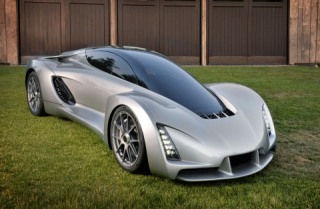Jun 25 2015
Divergent Microfactories has found an innovative way of using 3D printing to transform vehicle production, enabling vehicles and other large complex structures to be built using less material and at lower capital costs.
 Blade - The first 3D-printed supercar built using Divergent Microfactories' Node Technology Platform (Photo: Business Wire)
Blade - The first 3D-printed supercar built using Divergent Microfactories' Node Technology Platform (Photo: Business Wire)
This new approach is based on the Node Technology Platform, a proprietary solution of Divergent Microfactories. As part of the announcement, the company has unveiled a first-of-its-kind 3D-printed supercar called Blade, which was designed and constructed using this technology.
A Node is a 3D-printed aluminum joint, which is used for connecting pieces of carbon fiber tubing to build the chassis of the car. This breakthrough technology allows the chassis to be assembled within minutes, cutting down on the amount of 3D printing needed significantly, thereby addressing time and space constraints.
As well as considerably lowering material and energy consumption, the Node-enabled chassis has a weight of just 10% of conventional cars, but with high strength and durability. This means less wear and better fuel efficiency.
According to Divergent Microfactories, the prototype car is one of the world’s most powerful and eco-friendly cars. A powerful 700 horsepower bi-fuel engine is used, capable of using either compressed natural gas or gasoline and enabling the car to go from 0-60 in a mere 2 seconds. The weight of the prototype vehicle is 1,400 lbs.
Kevin Czinger, founder and chief executive officer of Divergent Microfactories, announced the company’s plans for dematerialization and democratization of vehicle production. The objective is to provide small entrepreneurial teams across the globe with the platform so that they can establish their own microfactories to manufacture their own cars, as well as other large complex structures.
With these microfactories, innovation will become affordable with the additional benefit of reduced health and environmental impacts of conventional manufacturing. The plans also include selling of a limited number of high-performance vehicles, which will be built at Divergent Microfactories’ own microfactory.
“Society has made great strides in its awareness and adoption of cleaner and greener cars. The problem is that while these cars do now exist, the actual manufacturing of them is anything but environmentally friendly,” said Kevin Czinger.
“At Divergent Microfactories, we’ve found a way to make automobiles that holds the promise of radically reducing the resource use and pollution generated by manufacturing. It also holds the promise of making large-scale car manufacturing affordable for small teams of innovators. And as Blade proves, we’ve done it without sacrificing style or substance. We’ve developed a sustainable path forward for the car industry that we believe will result in a renaissance in car manufacturing, with innovative, eco-friendly cars like Blade being designed and built in microfactories around the world.”